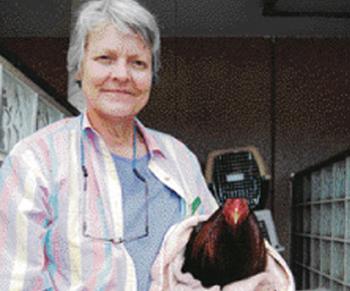Regal, statuesque and fit for combat, fighting cocks are the gladiators of the bird world — raised and trained to kill. Only these gladiators don’t have armor to protect their flesh, just a layer of radiant feathers. On May 15,
Regal, statuesque and fit for combat, fighting cocks are the gladiators of the bird world — raised and trained to kill. Only these gladiators don’t have armor to protect their flesh, just a layer of radiant feathers.
On May 15, 125 fighting cocks were taken into protective custody by the Kaua‘i Humane Society after being confiscated from a cockfight in Kapa‘a by the Kaua‘i Police Department’s specialized unit. Of the total, 71 remain alive.
“We had to euthanize a pile of them on in-take due to severe lacerations,” said Dr. Becky Rhoades, executive director of the Kaua‘i Humane Society. “Some still had the gaffs on them.”
A gaff is a razor-sharp knife attached to the bird’s leg for the match.
Rhoades described the scene as brutal — with defeated roosters suffering lacerations five to seven inches long and two inches deep covering the birds’ bodies, necks and legs.
“They fight until they die or collapse,” she said. “The fighters don’t even euthanize them. They either throw them in a pile or back in a crate to die on their own. That’s what I find really horrific.”
The case remains under police investigation. See an upcoming edition of The Garden Island for more information on the legal proceedings.
Rhoades is continuing her quest to amend federal anti-animal fighting laws in Hawai‘i.
“When we go to the Legislature every year to testify on trying to strengthen the laws to stop cockfighting in Hawai‘i, (cock fighters) get up there and testify on how (cockfighting) is more humane than a slaughter- house death.”
Of the three cases Rhoades has done with police since 2001, this was the largest with more than 100 roosters and $70,000 in cash seized.
“We always respond because we feel it’s very important they don’t release the roosters,” she said. “They’re a gambling device and just used for fighting and they are going to be used again if we release them.”
Trained killers, fighting cocks can’t be released into the wild, and being roosters, they’re not good eating. Until the case is settled in court, the roosters will remain at the humane society.
Meanwhile, stacks of crates hold individual roosters in the secure residential boarding section of the humane society. Daily care of the roosters takes one employee five hours a day. Roosters are rotated between larger and smaller crates daily.
Employee Nadine Naumu hoses down the kennels, feeds the roosters, alternates them in cages and cleans their crates.
“It’s a lot of work,” she said.
• Pam Woolway, lifestyle writer, can be reached at 245-3681 (ext. 257) or pwoolway@kauaipubco.com



